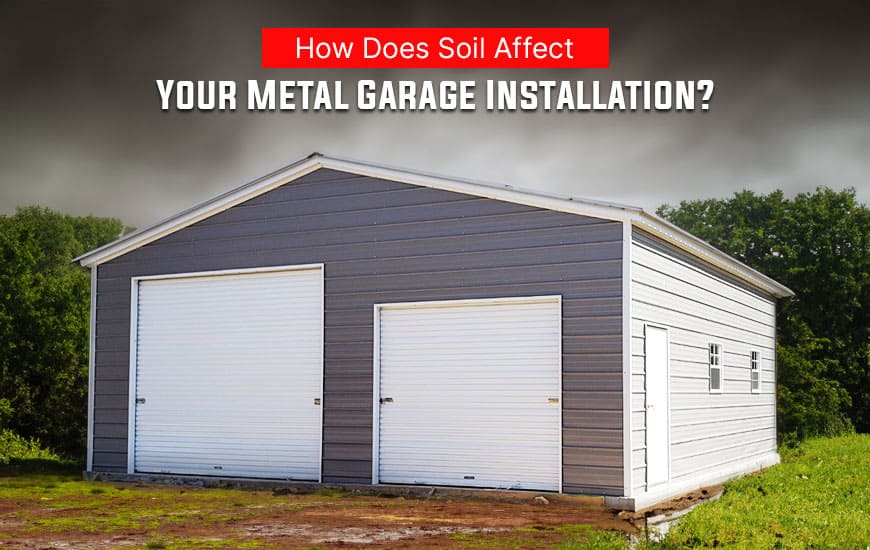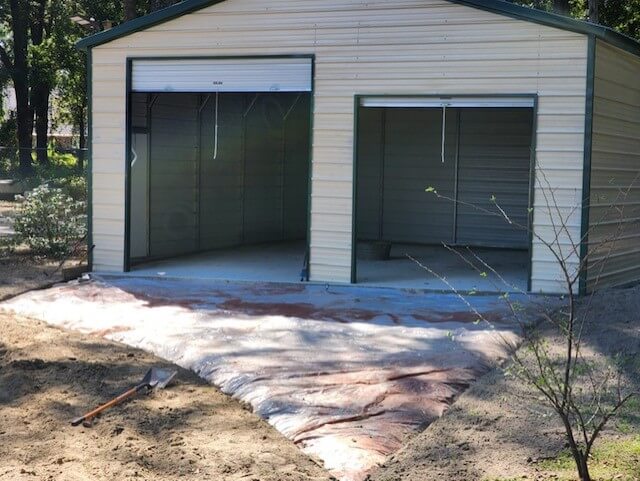
As one can imagine, the ground on which you install your metal garage plays a pivotal role in how well it performs and how long it lasts. Your soil will endure enormous weight, handle water, and withstand erosion. As such, choosing the right soil for your environment is incredibly important.
So, whether you’re building a custom garage or planning a commercial-grade facility, you’ll need a comprehensive understanding of your soil type and what it can handle. In this blog, we’ll explore this subject in greater detail and show you how your soil can affect the installation of metal garages.
Understanding the soil type where you plan to build is crucial to the health of your structure. This soil composition plays a significant role in determining the stability and longevity of your metal garage foundation. Let’s look at a few types of soil:
Clay soil is composed of fine particles and has a high water-holding capacity. While it can provide good support for buildings when dry, clay soil tends to expand and contract with moisture changes, leading to significant movement in the foundation. Proper drainage systems and foundation designs that account for potential soil movement should be implemented to mitigate the risks associated with clay soil.
Sand and gravel are well-draining soil types that offer good load-bearing capacity. They are composed of larger particles, allowing water to pass through freely. This soil type is generally stable, making it an excellent choice for metal building foundations. However, it’s essential to ensure proper compaction during construction to avoid settling or shifting over time.
Rock or bedrock soil is the most stable and reliable for constructing metal building foundations. It provides excellent load-bearing capacity and minimal susceptibility to movement. If your construction site has bedrock near the surface, it can serve as a solid foundation for steel garages or garage kits, minimizing the need for extensive excavation or additional foundation support.
Loam soil is a balanced mixture of sand, silt, and clay. It offers good drainage, moisture retention, and fertility, making it ideal for gardening but may present challenges for foundation construction. Loam can expand when wet and contract when dry, leading to potential movement in the foundation. Careful consideration of site preparation and foundation design is necessary to ensure stability when building on loam soil.
Peat soil consists of partially decomposed organic matter and is often found in wetland areas. It has poor load-bearing capacity and tends to compress under heavy loads. Building on peat soil requires special considerations, including deep foundations or soil stabilization techniques such as soil replacement or geotechnical reinforcement to provide sufficient support for metal building foundations.
Silt soil is composed of fine particles, smaller than sand but larger than clay. It has moderate water-holding capacity and can be prone to erosion when exposed to water flow. When constructing metal building foundations on silt soil, proper drainage measures are essential to prevent water accumulation and potential instability. Additionally, foundation design should account for potential settlement due to the compressible nature of silt.

Sometimes, you may not have a choice in the soil type available. In this case, adjusting your foundation type may be an easier option than paying a grading contractor to transport a new soil type for your property. Let’s look at a few metal garage foundation types that are commonly used:
A dirt or gravel foundation is a simple and cost-effective option commonly used in areas with well-draining soil, such as sand and gravel. It is particularly suitable for sites with stable soil conditions and minimal risk of moisture-related issues. The loose nature of the soil allows for easy drainage, preventing water accumulation that could compromise the foundation’s stability.
An asphalt foundation provides a durable and smooth surface for metal buildings, making it an excellent choice for areas with clay or silt soil. By constructing an asphalt foundation, you create a stable and moisture-resistant layer that helps mitigate the impact of soil movements on the structure above.
Concrete foundations are widely used for their strength, durability, and versatility. They can be tailored to suit various soil types, making them a reliable choice for metal buildings on different soil compositions. Concrete foundations are particularly suitable for sites with rock/bedrock soil or loam soil. Rock/bedrock provides a solid base, ensuring excellent load-bearing capacity, while loam soil requires a stable and robust foundation to counter potential soil movements.
Garage Buildings has years of experience helping customers find the perfect metal garage for their needs. Whether it’s smaller metal garage kits or larger commercial-grade buildings, we have the skills and experience to deliver a product that lasts and customer service that goes far beyond the sale.
We back our structures up with leading certifications, warranties, and craftsmanship guarantees, so you know your building is engineered to handle any job and environment.
So, if you are tired of searching for the right metal garage for sale, give the experts at Garage Buildings a call at +1 (866) 355-4442. We’ll be happy to walk you through the design process and customize your building for your specific needs. From top to bottom, we’ll help you envision and realize the structure of your dreams!